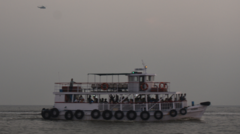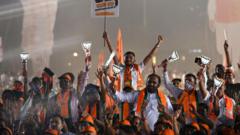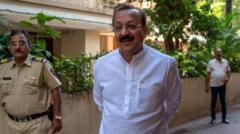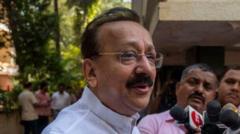The call by a hard-line Hindu organization to remove the tomb of Mughal ruler Aurangzeb has led to violence in Maharashtra, revealing the fraught dynamic between Hindu nationalists and the Muslim community in India. The incident showcases how historical narratives continue to influence contemporary social tensions.
Communal Tensions Erupt in Maharashtra Over Mughal Ruler's Tomb

Communal Tensions Erupt in Maharashtra Over Mughal Ruler's Tomb
A right-wing Hindu group's demand for the demolition of Aurangzeb's tomb has ignited communal violence in Nagpur, sparking curfews and highlighting ongoing historical grievances.
In Maharashtra, India, tensions have erupted following a right-wing Hindu group's call for the removal of the tomb of Aurangzeb, a controversial 17th-century Mughal ruler. This request has led to communal violence in Nagpur, culminating in the imposition of a curfew in the region. The unrest underscores the larger issue of Hindu nationalists leveraging historical grievances to fuel animosity towards India's sizable Muslim population, which numbers around 200 million.
The violence unfolded earlier this week as a response to the demands made by the Vishwa Hindu Parishad (V.H.P.), a militant Hindu organization. The group's call coincided with the birth anniversary of Chhatrapati Shivaji, a revered figure among Hindus who is often positioned in opposition to Aurangzeb's legacy. Shivaji, who fought against Mughal authority, is celebrated in Hindu nationalist rhetoric, making the timing of the protests particularly provocative.
Protesters gathered outside a statue of Shivaji in Nagpur, where they burned an effigy of Aurangzeb draped in green cloth, a color associated with Islam. The demonstrations escalated, leading to clashes as tensions boiled over among locals. The demand for Aurangzeb’s tomb’s demolition, located nearly 300 miles away in Chhatrapati Sambhajinagar (formerly Aurangabad), highlights ongoing efforts by right-wing groups to reshape narratives surrounding India's Mughal history.
By midweek, authorities managed to contain the violence, but the underlying issues remain. The incident illustrates how historical events continue to play a significant role in contemporary identity politics in India. This flare-up emphasizes the delicate balance between historical interpretation and the current social landscape, revealing ongoing friction as communities recall past grievances and seek to navigate their meanings in today’s world.





















